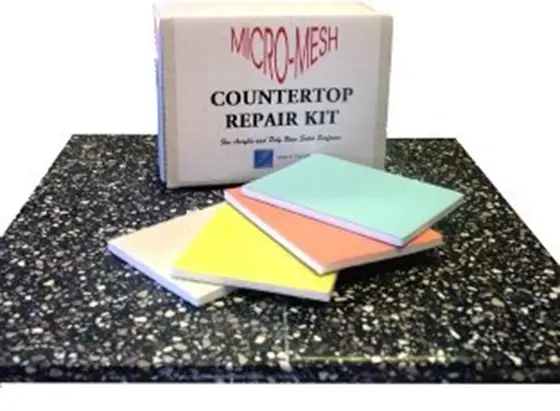Solid Surface Countertop Materials & Manufacturers
Solid Surface Countertop Materials
The plastics industry flourished in the 1960's and 70's. It is still a growth industry today. There have been significant advancements in plastics technology which allow plastics to replace more conventional materials.
Certain plastics are extremely durable and have exceptional hardness. These plastics have found their way into the kitchen countertop market within the past twenty years.
Products which are technologically advanced often are very expensive when first introduced into the marketplace. Solid surface countertops were by no means an exception. These materials were very expensive 10 to 15 years ago.
Today, solid surface materials are still somewhat expensive, however, the price continues to drop each year. Even at current price levels, they are a tremendous value. These materials offer many advantages over other countertop materials.
Many solid surface countertops that are currently available are, for the most part, primarily plastic. There are other solid surface materials, such as cultured marble, granite, slate, marble, concrete, etc., however, these materials don't perform like the plastic compounds.
The plastic compounds have superior stain resistance. Many of them have tremendous impact resistance (it's tough to crack them.) Some of them can be seamed together into one solid piece using special compounds. Manyof them can be repaired easily. Certain plastic solid surfacing materials can be bent into curves.
The overall performance characteristics of the solid surface countertop materials made from plastics depend upon the type of plastic from which the countertop is made. There are differences in the chemical makeup of the different plastics. Some of the countertops contain acrylic plastics in varying quantities. While other countertops are a blend of polyester plastic and acrylics.
The 1990 Modern Plastics Encyclopedia states that "Acrylic is selected for many applications because of a unique combination of properties... good surface hardness... exceptional weatherability... chemical and environmental resistance... and excellent mechanical stability..." Based upon this information, one might assume that those materials which have the highest acrylic content quite possibly will outperform the other materials.
My experience with these countertop materials has been extremely favorable. They are very beautiful and easy to care for. Because they are solid, colors and patterns are uniform. Scratches and minor burns can be sanded out.
Virtually any edge treatment is possible, as these materials work just like wood. You can cut any shape you like on the edge. When installed by professionals, it is virtually impossible to determine the location of seams. These characteristics are simply not available in any other countertop material that I am aware of.
Many of my past remodeling jobs included solid surfacing materials. Each and every customer of mine was pleased with the material. Not one customer has ever regretted installing the solid surfacing materials. I suggest that you give them serious consideration as the material for your next kitchen or bath countertop.
Care & Maintenance of Solid Surface Materials
Many of these solid surface materials are unharmed by virtually any liquid you would normally have around your house. However, to be on the safe side, always clean up spills promptly.
These materials clean up with ordinary soap and water very quickly. They never need to be sealed. Do NOT place hot items (pots, pans, pizza pans, cookie sheets, etc.) directly on these tops! Many of them can be permanently discolored and damaged by excessive concentrated heat! Always place hot objects on trivets.

If you've suffered damage to your Solid Surface Countertop CLICK THE IMAGE to get an all inclusive kit to repair the damage.
Minor scratches and burns can often be buffed out using readily available abrasive cleansers, very fine sandpaper, or a 3M Scotch Brite pad. However, do not attempt to buff scratches or gouges unless you receive specific instructions from a local distributor. Each solid surface material has its own distinct method of repairing scratches, burns, gouges, etc.
Most of the solid surface manufacturers provide a very nifty maintenance and repair kit on new installations. If you do not have one, determine who made your countertop and see about getting one.
Check out the manufacturers' web sites for excellent care and maintenance information. As you can imagine, they want the countertops to look brand new at all times. What better selling tool, than your satisfaction! Should you purchase one of these materials, I hope you are as satisfied as my past customers
Solid Surface Countertop Manufacturers
- Aristech Acrylics
Acrystone Solid Surface. - Corian
Corian is a solid, nonporous material which contains a unique blend of natural minerals and 100 percent high-performance acrylic. - Avonite
Avonite is a nonporous homogeneous blend of polyester/acrylic alloys and fillers. - Formica Solid Surfacing
Solid Surfacing is a fully densified composite material of modified resin and mineral filler. - Cerata - Hartson Kennedy
Cerata is an isophthalic/neopentyglycol resin with acrylic modifiers, ATH fillers, pigments, matrix chips and catalysts. - Florenata
Non-porous, seamless countertops. - Wilsonart Gibraltar
Gibraltar is a homogeneous blend of polyester and acrylic resins, fire-retardant fillers and proprietary coloring agents. - Swanstone
Swanstone is a homogeneous, nonporous reinforced, modified acrylic filled with natural minerals. - Centura
Centura is a polymerized mixture of polyester resin and hydrated Alumina. - LG HI-MACS Volcanics
Acrylic solid surfaces. - Lippert Corp.
Solid surface countertops and sinks. - Meganite
Non-porous, homogeneous solid surface countertops. - Samsung
Staron 100% acrylic solid surface countertops. - Askilan
Askilan is a fiber reinforced, temperature resistant composite material, like those developed and used for aircraft and space applications.
Column B041